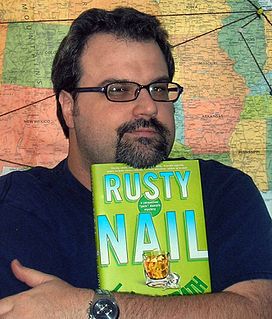A Quote by Melissa Febos
I more seriously considered publishing it under a pseudonym than I considered publishing it as fiction. I think the decision to write it as nonfiction happened at the very outset of the process, because the overwhelming impetus for writing this book was to understand what the experience meant, and to override my own reductions and rationalizations, whatever story I had that was not true. It didn't sit well with me and I needed to answer that. That's sort of the reason I write everything.
Related Quotes
I write fiction longhand. That's not so much about rejecting technology as being unable to write fiction on a computer for some reason. I don't think I would write it on a typewriter either. I write in a very blind gut instinctive way. It just doesn't feel right. There's a physical connection. And then in nonfiction that's not the case at all. I can't even imagine writing nonfiction by hand.
The other reason I didn't want to fictionalize it is because one of the main points of publishing a memoir in nonfiction was that I wanted to write about what had been a very lonely experience. The books that most saved my life as a kid were the ones that articulated lonely experiences that I had thought were mine alone.
Well, first you have to love writing. A lot of authors love having written. But I enjoy the actual writing. Beside that, I think the main reason I can be so prolific is the huge amount of planning I do before I start to write. I do a very complete, chapter-by-chapter outline of every book I write. When I sit down to write, I already know everything that's going to happen in the book. This means I've done all the important thinking, and I can relax and enjoy the writing. I could never write so many books if I didn't outline them first.
I didn't know enough as a writer to understand why I needed to do this, but I understood in a very gut way that I could not entertain those thoughts of pleasing people and write this book - that it would be a very different book. Without really sort of investigating that instinct, which I'm glad for, I just made a conscious decision to put blinders on and not think about anything and put it all in. And I did. I put everything in. I had to look at the whole picture to see what I needed.
Eragon started as me but ended up evolving into his very own character, .. Even as he has gone through his coming- of- age story, the process of writing and publishing these novels has been my own coming- of- age story. There are parallels between my own experience and Eragon's, but fortunately, I don't have people charging at me with swords.
There is a marvelous peace in not publishing. It's peaceful. Still. Publishing is a terrible invasion of my privacy. I like to write. I live to write. But I write just for myself and my own pleasure. I don't necessarily intend to publish posthumously, but I do like to write for myself. I pay for this kind of attitude. I'm known as a strange, aloof kind of man. But all I'm doing is trying to protect myself and my work.
The process for writing a picture book is completely different from the process of writing a chapter book or novel. For one thing, most of my picture books rhyme. Also, when I write a picture book I'm always thinking about the role the pictures will play in the telling of the story. It can take me several months to write a picture book, but it takes me several years to write a novel.
Writing has nothing to do with publishing. Nothing. People get totally confused about that. You write because you have to - you write because you can't not write. The rest is show-business. I can't state that too strongly. Just write - worry about the rest of it later, if you worry at all. What matters is what happens to you while you're writing the story, the poem, the play. The rest is show-business.
You'd better discover a more important motive than publication for your work or else you'll go crazy. My sense is that you'll be writers only if you are convinced that to write is something for which there is no substitute in your life. You must therefore be ambitious for your work rather than for its promotion. The good news here is that if you assign secondary importance to publishing and primary to writing itself, you will write better, and will thus increase your odds of getting publishing.
Now, almost twenty years since my last job in book publishing, I know that there are far more socially inept people in book than in magazine publishing. At the time, however, I just didn't feel I was enough: smart enough, savvy enough, well read enough, educated enough, charming enough. Much of this was probably because I was very naive, and didn't really know how to behave in an office. This made me a terrible assistant, which in turn made me a terrible junior book editor.






























